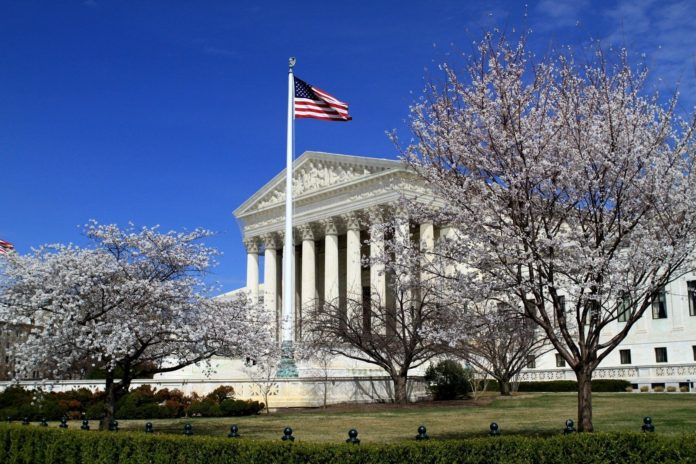June 27, 2019
The Supreme Court’s conservatives decided Thursday that federal courts do not have a role to play in deciding whether partisan gerrymandering goes too far.
The 5-to-4 decision was written by Chief Justice John G. Roberts Jr., who was joined by the court’s other conservatives.
“We conclude that partisan gerrymandering claims present political questions beyond the reach of the federal courts,” Roberts wrote. “Federal judges have no license to reallocate political power between the two major political parties, with no plausible grant of authority in the Constitution, and no legal standards to limit and direct their decisions.”
Justice Elena Kagan dissented for the court’s liberals. “For the first time ever, this court refuses to remedy a constitutional violation because it thinks the task beyond judicial capabilities,” she wrote.
Kagan underscored her disagreement by reading a lengthy excerpt of her dissent from the bench.
While the Supreme Court regularly scrutinizes electoral districts for racial gerrymandering, the justices have never found a state’s redistricting map so infected with politics that it violates the Constitution. Such a decision would have marked a dramatic change for how the nation’s political maps are drawn.
The court passed up the chance last term to settle the issue of whether courts have a role in policing partisan gerrymandering, sending back on technical rulings challenges to a Republican-drawn plan in Wisconsin and the challenged Maryland map.
There’s been less reticence outside the Supreme Court. With recent decisions in Ohio and Michigan, federal courts in five states have struck down maps as partisan gerrymanders. And last fall, voters in Michigan, Ohio, Colorado, Missouri and Utah either took redistricting away from politicians or limited their power.
Last June, the justices said the Maryland case was not ready for them and sent it back. In November, a three-judge panel unanimously found that Democrats had unconstitutionally targeted Republican voters in the 6th Congressional District. The legislature had redrawn the district, which previously stretched across the top of the state, to dip down and take in Democratic strongholds in the Washington suburbs.
After the 2011 redistricting, a Democrat won the seat previously held by a Republican. There was an open election in the district in November, when Democrat David Trone defeated Republican Amie Hoeber by a wide margin.
“The massive and unnecessary reshuffling of the Sixth District, involving one-half of its population and dictated by party affiliation and voting history, had no other cause than the intended actions of the controlling Democratic officials to burden Republican voters by converting the district” into a Democratic one, wrote Judge Paul V. Niemeyer of the U.S. Court of Appeals for the 4th Circuit.
Rather than redraw the map, as the federal judges had ordered, Democratic Attorney General Brian E. Frosh decided to appeal to the Supreme Court. That put him at odds with the state’s Republican Gov. Larry Hogan, who also won reelection in November and has pushed three times for a constitutional amendment that would have an independent commission redraw boundaries.
The Supreme Court also sent back a North Carolina case last term, telling a panel of three federal judges to decide whether challengers in that state had the legal standing to bring the challenge. The judges said they did and also found that the legislature’s efforts violated constitutional protections of equal protection and free speech.
The North Carolina legislature “drew a plan designed to subordinate the interests of non-Republican voters not because they believe doing so advances any democratic, constitutional, or public interest, but because, as the chief legislative mapdrawer openly acknowledged, the General Assembly’s Republican majority ‘think[s] electing Republicans is better than electing Democrats,’” wrote Judge James A. Wynn Jr. of the U.S. Court of Appeals for the 4th Circuit.
“But that is not a choice the Constitution allows legislative mapdrawers to make.”
Wynn was referring to comments from a legislative leader after a previous map was struck down as an example of racial gerrymandering that made clear politics was at the heart of the new map.
“I think electing Republicans is better than electing Democrats,” said Rep. David Lewis, a Republican member of the North Carolina General Assembly, addressing fellow legislators when they passed the plan in 2016. “So I drew this map to help foster what I think is better for the country.”
Lewis proposed drawing the map so Republicans could prevail in 10 of the 13 districts, and that’s what happened when voters went to the polls that year, even though Republican candidates won just 53 percent of the statewide vote.






